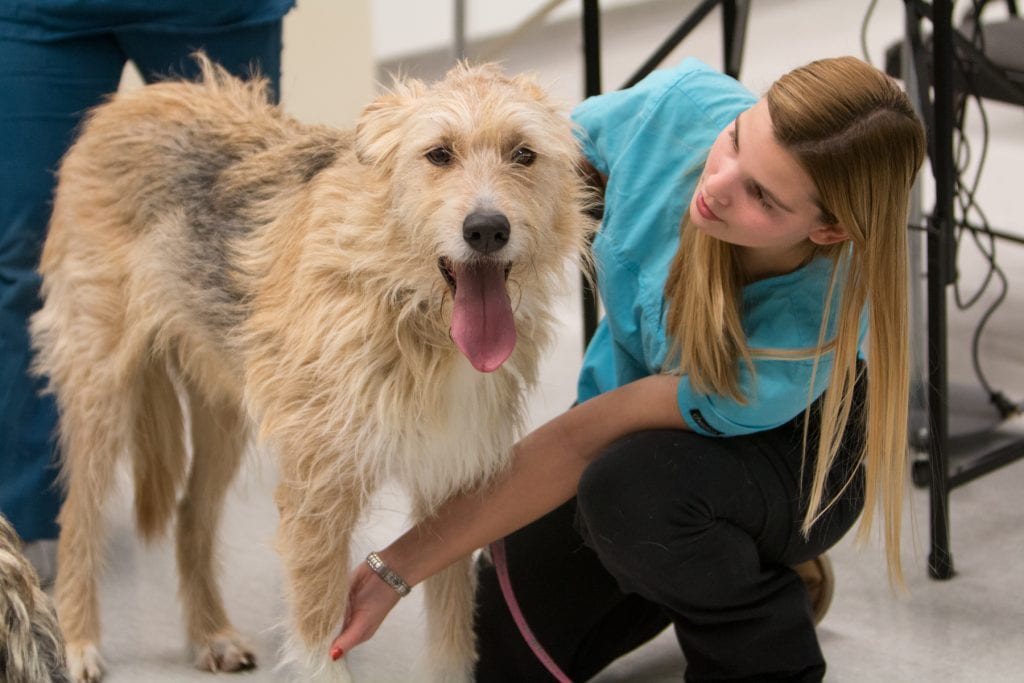Canadian Animal Blood Bank celebrates 25 years; partnership with RRC thrives
From skilled trades to health sciences, Red River College’s Notre Dame Campus (NDC) is home to a wide variety of growing talents. What many might not know is that, in a quiet corner of the campus’s mall level, dogs have been giving blood and saving lives for a quarter century.
The Campus is home to the Canadian Animal Blood Bank (CABB), an organization launched in Winnipeg that’s become the national leader in collecting and distributing life-saving canine blood donations to veterinary clinics across the country. This year, CABB celebrates its 25th anniversary.
“We have a really swanky lab here, considering we basically started in a closet,” says Beth Knight, CABB laboratory director and RRC grad, with a laugh.
“It was a storage space and it’s phenomenal how we’ve grown. For that, Canadian Animal Blood Bank can never thank Red River College enough for what they’ve done for us, because they give us a roof over our head, a phone, computers, a parking lot, access to a space — the gift they’ve given can never be totally appreciated.”
CABB was started in 1996 as the brainchild of Dr. Ken Mould, a Winnipeg-based veterinarian who saw the need in Canada for canine blood banking, instead of requiring vets to travel to the U.S. border for dated, substandard product. Since the organization’s beginning, when they worked with just a few local veterinary clinics in Manitoba, they’ve expanded into several provinces.
“We’ve grown from one or two clinics to where we are now, with multiple sites across Canada that collect. We have Alberta, Ontario, Montreal — and we’ve recently started looking at expanding into the Atlantic provinces,” says Isabel Bright, current CABB board member and Dean of RRC’s School of Indigenous Education.
As the former Chair of Life Sciences (2011-2021), Bright has seen first-hand how the relationship between RRC and CABB has helped foster that growth, and goes a lot deeper than just brick and mortar. The clinic at NDC is a pragmatic learning opportunity for those in the College’s Veterinary Technician program.
“Students have an opportunity to volunteer and to learn about transfusion medicine from the experts at the blood bank,” says Bright. “There are also some conferences that we’ve shared together so students have an opportunity to learn and hear from experts in different parts of the country for the latest in blood banking and transfusion medicine.”
In her role as the public face of CABB, Beth Knight also regularly educates students on animal blood banking, and RRC grads often enter the workforce with more knowledge on the topic because of their direct experience with the bank.
“We ask the second-year students to attend at least three donations — two during the pandemic — and they get into the practical aspects of what the blood bank is,” says Knight.
“With a two-hour transfusion medicine lecture and a supportive, hands-on wet lab in crossmatching blood, these graduates are often more prepared than the veterinary staff, with current materials, methods and skillsets for any transfusion procedure.”
Knight also sees this as indicative about animal blood banking and awareness at large.
“We are probably one of the best kept secrets at Red River College. Lots of people don’t know about us and I always say to pet owners that you’re very fortunate — if you don’t know about us, that means your pet has never needed blood.”
The canine donors themselves also provide a great opportunity for students. It takes a special dog to donate blood — one that has a great temperament and can stay calm through the procedure. The dogs need to be a particular age and size to be considered for donating, too: one to eight years old and at least 55 pounds.
“We really do pick the cream of the crop,” says Knight. “We pick those dogs that are really quite remarkable in strangers’ hands.”
While recent growth has created a lot of excitement around CABB’s anniversary, plans for a celebration have been put on hold due to public health orders.
“We were hoping to be able to do something, especially since we’ve expanded so far nationally, but I think it’ll be ‘25th plus one,’ with us doing something next year,” says Knight.
For now, the quiet work of saving the lives of four-legged family members continues as — pandemic or not — donations will filter through the the College’s mall-level lab for many years to come.
Profile by John Gaudes (Creative Communications, 2012)

